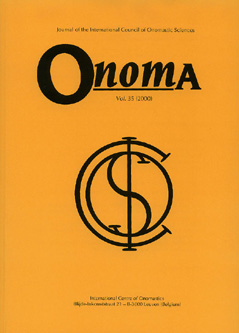 previous article in this issue previous article in this issue | next article in this issue  |

Preview first page |
Document Details : Title: On the Choice and Use of Onomastic Sources in Teaching as a Method for an Interdisciplinary Approach Author(s): CAFFARELLI, Enzo Journal: Onoma Volume: 39 Date: 2004 Pages: 61-76 DOI: 10.2143/ONO.39.0.2020703 Abstract : This paper aims to show the advantages, for students, in searching and analysing new data in the three following relevant research issues: research in the field (involving local speakers and environment studies), in archives, and the Internet. For each subject (odonyms, brand names, nicknames, personal names, chrematonyms, and so on), connections between onomastics and other disciplines will be stressed. The present work arises from the elaboration of an experience of teaching conducted at the Department of Ancient World and Classical Traditions at the 2nd University of Rome “Tor Vergata”, during a 30-hour course attended by more than 100 students of General Linguistics, Glottodidactics, Applied Linguistics, and The History of the Italian Language. This didactic experience seems to demonstrate that both students and teachers are very interested in onomastics and that the consultation of sources strictly connected to the students’ daily lives can really be particularly profitable in name studies. Dans cet article on tentera de démontrer les avantages découlant, pour les étudiants, de la collecte et de l’utilisation de nouvelles données dans trois secteur importants: la recherche sur le terrain au moyen d’interviews, la recherche dans les archives et l’Internet. Pour chaque thème (odonymes, noms de marques, sobriquets, anthroponymes, chrematonymes, etc.) on mettra en evidence les relations entre l’onomastique et les autres disciplines. Cette présentation a été inspirée par une expérience didactique menée auprès du Département d’Antiquités et Tradition classique de l’Université de Rome 2 “Tor Vergata”, dans le cadre d’un cours de 30 heures auquel ont participé plus que 100 étudiants des disciplines Linguistique générale, Glottodidactique, Linguistique appliquée et Histoire de la langue italienne. Cette expérience semble démontrer que les étudiants et leurs enseignants sont très interessés par l’onomastique et qu’il est tout à fait possible de mener ces études en utilisant des sources fortement liées à la vie et aux expériences quotidiennes des étudiants. Ziel des vorliegenden Aufsatzes ist es, die Vorteile aufzuzeigen, die sich für Studenten bei der Suche und Analyse von neuen Daten auf den folgenden drei Forschungsgebieten ergeben: Feldarbeit (in Zusammenarbeit mit örtlichen Vertretern bei gleichzeitiger Nutzung von Umweltstudien), in Archiven und im Internet. Dabei wird für jeden Namentypus (Straßennamen, Markennamen, Kosenamen, Personennamen, Chrematonyme usw.) der Zusammenhang zwischen Namenkunde und anderen Disziplinen betont. Das hier vorgestellte Projekt ist aus einem 30-stündigen Kursus hervorgegangen, der von der Abteilung für antike und klassische Traditionen der Zweiten Universität Roms "Tor Vergata" angebotenen wurde und an dem über 100 Studentinnen und Studenten der Fachgebiete allgemeine Sprachwissenschaft, angewandte Sprachwissenschaft und Geschichte der italienischen Sprache teilgenommen haben. |
|


